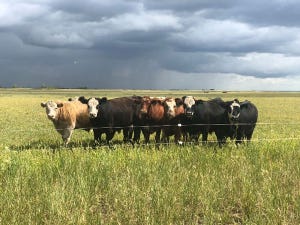It didn’t matter whether you were talking to members of the National Cattlemen’s Beef Association (NCBA), the Federation of State Beef Councils (FSB), or Cattlemen’s Beef Board (CBB), the general sentiment at last week’s summer meeting in Denver was frustration that the situation had disintegrated to the level it has, and that it should never have happened.

It didn’t matter whether you were talking to members of the National Cattlemen’s Beef Association (NCBA), the Federation of State Beef Councils (FSB), or Cattlemen’s Beef Board (CBB), the general sentiment at last week’s summer meeting in Denver was frustration that the situation had disintegrated to the level it has, and that it should never have happened.
I’ve had the opportunity to talk to many of the people who have served in leadership roles in NCBA and the CBB. Almost without exception, they all think it’s important to step back, let emotions cool, and refocus on making producers more profitable and sustainable by improving beef demand and the business environment producers operate in.
These leaders know that building demand and speaking with one effective voice is more important than ever, and that allowing political and power struggles to override the best interests of producers is counterproductive. I concur with what they’re saying – if they’re correct in assuming that the leadership and staff are truly focused on the best interests of the industry rather than personal political agendas.
Still, it’s important to understand the dynamics in order to assess whether that’s true or not. I hope I’m wrong, but I think this is just the beginning of yet another long, protracted and counterproductive intra-industry struggle.
So, how did we get to where we are today? The short version is that there’s been tension between NCBA and CBB ever since the merger. The cultures between the organizations were drastically different and they never successfully merged. One organization was designed to disperse the money, while the other was designed to implement programs; plus, the implementing organization was joined with an organization that forms policy.
The firewall between the policy and checkoff sides was, is, and always will be critically important, but that has and will continue to be a red herring. The problem is that the demand side must be involved in issues management. Whether it’s BSE, E. coli, dietary guidelines, animal welfare or environmental issues – beef demand is very dependent on consumer perceptions.
And how can you deal with an issue without having policy? The two by their very nature are intertwined. Plus, when you have an organization like NCBA, which has policy on other issues that conflict with other producer policy aims, there are going to be inherent problems.
We merged the organizations creating a financial firewall that keeps them separate. But those who have issues with the policy side don’t separate the entities or are concerned about undue influence or advantages that the policy side might derive.
It’s no coincidence that this occurred as the GIPSA debate heats up. Study the players and you’ll see this is simply a continuation of the debate that created a civil war within the industry in the past. There are those generally opposed to modern agriculture, marketing methods and competing in a global marketplace; and there are those who embrace those very things.
It’s a debate between those who want to go back 20+ years in the way we market cattle, and those who embrace the economic realities and want to move forward aggressively. Unlike other industry differences in the past, there can be no compromise on this issue. This is a battle about the future of our industry. While the R-CALF- NCBA debate seemingly died with the demise of R-CALF, the philosophical differences that initially created that battle haven’t changed at all.
The difference is this battle is being carried out in the executive committee of CBB and through the halls of USDA. The players are different but the end game remains the same.
It isn’t necessary to get into all the details about audits and discrepancies, and how they’ve been handled in the past. Nor is it necessary to detail how these issues were found, how targeted it was, or why it was released in the manner it was. While many folks are talking about the small group who usurped the CBB executive committee, there’s plenty of blame to throw at NCBA, as well. Communication has been poor; in fact, the CBB didn’t even find out about its executive committee’s decision to separate, or the release of the audit, until they saw it in the media.
It’s impossible for me to believe that the players in this soap opera have been attempting to communicate. In its effort to streamline its structure, improve its governance and become more grassroots oriented, NCBA had initially given FSB members the right to vote on certain issues. NCBA failed to recognize the concerns raised by members who felt it would make the FSB vulnerable by being too close to policy issues. There have also been a lot of little issues over time that have been dealt with insufficiently as to generate justifiable mistrust and concern by some on the checkoff side.
Such issues have been allowed to fester. The bottom line is both entities took their eye off of the ball, got immersed in internal battles, and did nothing to mitigate them.
Yet, amazingly, very little has actually happened despite all this turmoil. NCBA was in the process of reworking its governance structure when the CBB executive committee passed a non-binding recommendation for total separation of the FSB and policy side, and put forth a plan where they along with USDA would essentially take over all parts of the checkoff. NCBA then shelved its governance discussion entirely in an effort to see what would be palatable to the CBB executive committee.
Then the FSB and the overall CBB membership essentially rejected the executive committee’s moves in a resounding fashion, while voicing support for a structure that provides more independence in the future. And all of this is taking place in the context of the big battle over the new GIPSA proposed rules
So what’s going to happen? The answer is unclear. Either cooler heads will prevail, talk it out and move forward aggressively according to the vision of the industry and its member producers; or things will get really nasty. If it gets nasty, we’ll see our industry’s ability to build demand and to speak effectively with one voice further weakened.
Interestingly, I’m not sure it’s the leadership that will decide the direction, as much as fed-up producers who will send a clear message to leadership about what they expect from these organizations. It’s up to producers to step forward and make it known that these types of self-destructive power struggles won’t be tolerated. If leadership refuses to listen and continues to chase agendas that are not producer driven and focused, then it’s time for leadership changes.
The damage so far done to NCBA and the checkoff isn’t irreparable, but we are at a crossroads. Perhaps this is just an embarrassing episode in the history of our industry where we strayed from the path, but it also could be a situation that if not rectified, ultimately costs the industry severely.
About the Author(s)
You May Also Like





